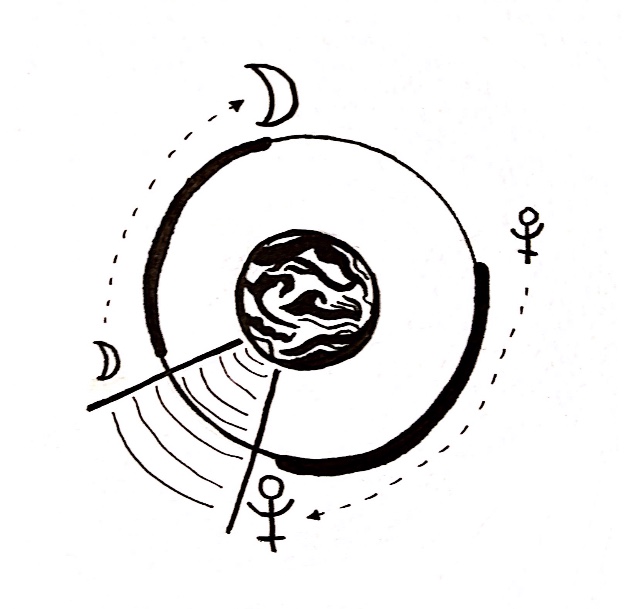I was searching the library for a non-existent study spot when I felt the buzz of a phone notification. I moaned, expecting yet another admin’s exit from the school, but the notification delivered a different message.
“Burn it all down and start over.”
These were not the words of a fear-mongering prophet, but rather of the horoscope app Co-Star. The app offers users a daily notification, like the one above, based on a user’s horoscope. It has become a well-received pop culture icon since its launch in 2017, with more than three million downloads. Notifications range from the benign (“Get a plane ticket if you can and just go”) to the aforementioned call for pyromania. The app also offers more detailed horoscope breakdowns, based on the placement of celestial bodies, for users to explore. Co-Star distributes all of its content through an algorithm that determines what you’ll receive each day based on information such as the date, time and location of your birth.
Co-Star provides us with seemingly divine guidance, dictating the (computer-generated) will of the stars as our fates and supposedly making our lives clearer. But it also invites passivity by depicting our fates as predetermined and unchangeable. Instead of passively accepting whatever prophecy of the day Co-Star throws at us, we should actively engage with horoscopes and use them to reflect on our behavior. And rather than letting algorithms tell us what to do, we need to remind ourselves that we control our lives — not some arbitrary arrangement of celestial bodies.
Sure, passively accepting what Co-Star says can be fun. I find it immensely amusing to see what Co-Star says about me, a Libra, and it’s fun to attribute the chaos of life to horoscopes. But this is no way to go about living; after all, our signs do not actually have any bearing on our lives. To do so represents a complete disregard for personal responsibility.
If anything, looking too deeply into astrology makes life more confusing, not less. For example, sign compatibility, where certain signs seemingly pair better or worse with other signs, poses an issue. I, a Libra, should theoretically be incompatible with any Cancers. And yet, one of my best friends since first year was born smack in the middle of Cancer season. Conversely, I know of other Libras I should be compatible with, but I’d rather wait in an endless Cooler line than deal with them.
Co-Star also introduces an unnecessary amount of complexity into our lives. For the app’s algorithm to function optimally, you need to provide not just your birthday, but your place and time of birth as well (another astrology app, Time Nomad, operates similarly). Co-Star uses this to provide detailed breakdowns of areas where you’ll have power, pressure and trouble during any given day. It’ll then do the same for all of your friends on Co-Star, giving you lengthy, algorithm-generated analyses of your relationships. Yet, an algorithm can’t control your life — you do.
I find Co-Star’s micromanaging entertaining (as of this writing, it’s telling me that I have trouble thinking — go figure). But it’s more info than anyone can reasonably use in their daily life. Co-Star once tweeted that, “It doesn’t reduce complexity” of its users with its unique horoscopes, yet at the same time it judges the entire lives of its users by defining them through algorithms. Additionally, the complexity Co-Star introduces through its micromanaged horoscopes is bad in its own right. Relationships are complex enough as it is without an algorithm-generated guide overloading me with information.
This is where I like Co-Star’s push notifications: they’re brief, thought-provoking and actionable. When it says “Try not to come to conclusions today,” I can think about how that relates to me in a constructive manner (although that won’t stop me from concluding this article). While having the notifications catered to your horoscope is amusing, it doesn’t necessarily provide any further benefit over simply reading and reflecting on them (remember, astrology isn’t real). We can have our advice-cake and eat it too.
I love Co-Star, its quirky notifications and its deep micromanaging. But I don’t love the idea of ceding control of my life to an algorithm or the classifications of horoscopes. However, by using Co-Star as a means of inspiring introspection and action, I feel as if I’m able to take a more thoughtful approach to life.
Don’t stop reading horoscopes by any means, but consider what you’re reading and think about how you might act on it instead of letting it act on you. Be friends with who you want to be and don’t get bogged down because some arbitrary star alignment is telling you what to do. Don’t wait for the stars to align — align them yourself.
Pablo Nukaya-Petralia is a senior art history major. He can be reached at pnukayapetra@oxy.edu.
![]()




































